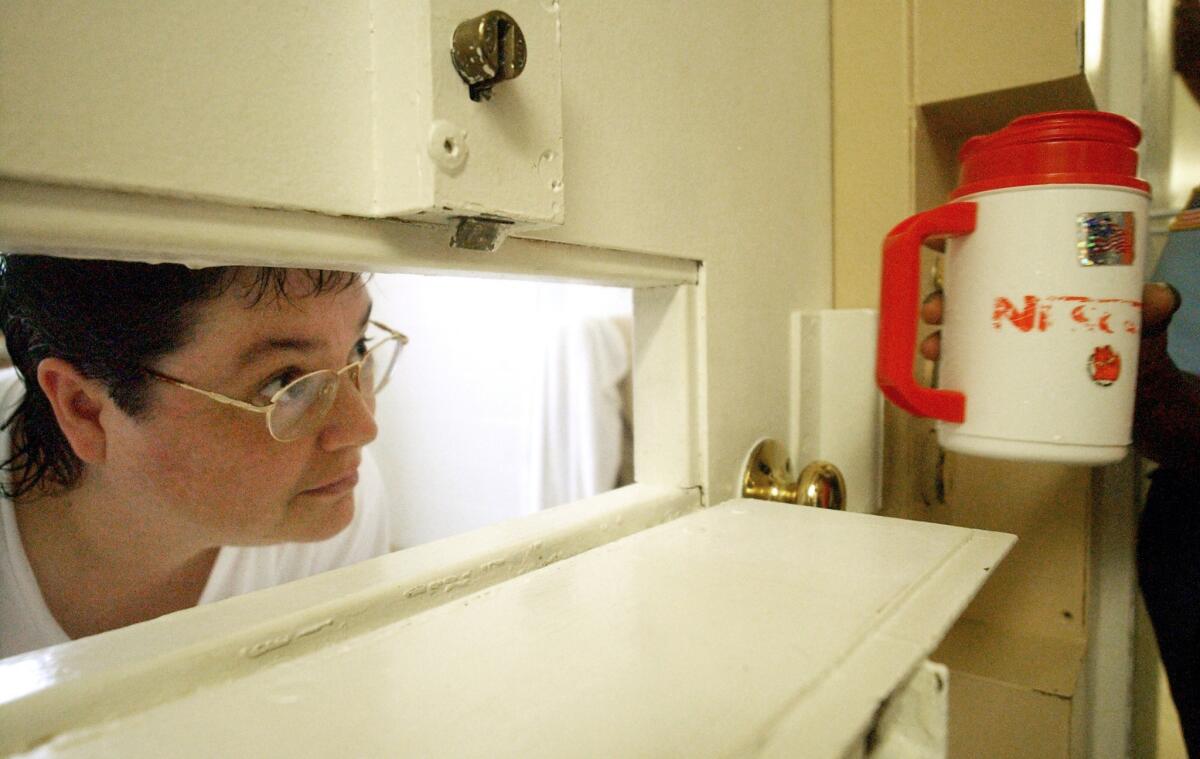Execution of Georgia woman postponed due to complications

Kelly Renee Gissendaner, the only woman on Georgiaâs death row, peers through the slot in her cell door as a guard brings her a cup of ice at Metro State Prison in Atlanta last year. Officials postponed her scheduled execution after the lethal injection drug cocktail planned for use in her execution looked cloudy.
A Georgia woman convicted of murdering her husband in 1997 was scheduled to be executed Monday night after she was twice denied clemency from the state parole board, but complications have put the execution on hold.
First, the Associated Press reported, a last-minute plea to the U.S. Supreme Court by her lawyers created a delay.
In addition, Georgia officials said there was a problem with the execution drug, noting that it appeared cloudy, so they have postponed the execution. A new date has not been set.
âPrior to the execution, the drugs were sent to an independent lab for testing of potency. The drugs fell within the acceptable testing limits,â according to a statement from the Department of Corrections. âWithin the hours leading up to the scheduled execution, the execution team performed the necessary checks. At that time, the drugs appeared cloudy. The Department of Corrections immediately consulted with a pharmacist, and in an abundance of caution, inmate Gissendanerâs execution has been postponed.â
Kelly Renee Gissendaner, 46, is the only woman on death row in the state and would be the first woman executed in Georgia in about 70 years, according to the state Department of Corrections.
Gissendaner had been scheduled to be executed by lethal injection Wednesday night at Georgia Diagnostic and Classification Prison in Jackson after the stateâs parole board denied clemency following a Tuesday hearing, according to the corrections department.
However, the execution was delayed until 7 p.m. Monday. No explanation was given for the decision, but bad weather had been expected. On Monday morning, her lawyers appealed to the parole board again, according to the Associated Press.
Once again, the board ruled that the execution stood, according to a statement from the board.
However, the U.S. Supreme Court was considering an appeal hours after the set execution time, according to the AP.
Late Monday night, Gissendaner was awaiting a response from the high court after an appellate court rejected her lawyersâ request to delay the execution on the grounds that Georgiaâs lethal-injection procedures arenât transparent enough to be challenged in court, according to the AP.
Separately, the U.S. Supreme Court denied an appeal by Gissendaner on Oct. 6, according to the State Board of Pardons and Paroles.
In Georgia, the governor does not have authority to grant clemency for death row inmates, said Steve Hayes, spokesman for the State Board of Pardons and Paroles. The parole board is the only entity with that authority.
Gissendaner was found guilty of malice murder in November 1998 in the slaying of her husband, which she planned and carried out with the help of her boyfriend, Gregory Owen, prosecutors said.
Owen received a life prison sentence after pleading guilty to his involvement: abducting the victim and taking him into the woods where he was stabbed in the neck eight to 10 times, prosecutors said. Gissendaner planned and was at the scene of the murder, prosecutors said.
Owen testified against Gissendaner at her trial. A jury sentenced her to death in 1998.
Gissendaner would be the 35th inmate put to death by lethal injection in Georgia since capital punishment was reinstated in 1973, according to the corrections department. There are 81 men on death row in Georgia.
Follow Ryan Parker on Twitter, Facebook and Instagram
More to Read
Sign up for Essential California
The most important California stories and recommendations in your inbox every morning.
You may occasionally receive promotional content from the Los Angeles Times.











